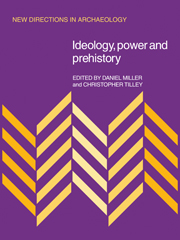Book contents
- Frontmatter
- Contents
- List of contributors
- Preface
- Part one Theoretical perspectives
- Part two Ideology and Power in the Present and Historical Past
- 2 Endo ceramics and power strategies
- 3 Interpreting ideology in historical archaeology: The William Paca Garden in Annapolis, Maryland
- 4 Modernism and suburbia as material ideology
- Part three Ideology and Power in Prehistory
- Part four Conclusions
- Index
4 - Modernism and suburbia as material ideology
Published online by Cambridge University Press: 05 March 2012
- Frontmatter
- Contents
- List of contributors
- Preface
- Part one Theoretical perspectives
- Part two Ideology and Power in the Present and Historical Past
- 2 Endo ceramics and power strategies
- 3 Interpreting ideology in historical archaeology: The William Paca Garden in Annapolis, Maryland
- 4 Modernism and suburbia as material ideology
- Part three Ideology and Power in Prehistory
- Part four Conclusions
- Index
Summary
This chapter illustrates how the critique of ideology can be used for the study of material objects by reference to the familiar contemporary built environment. An outline is given of the Frankfurt School's model of the relationship between science and technology, and ideological control. It is then shown how modernist architecture fulfils the expectations derived from the model. Modernism cannot, however, be understood in isolation, but only in relation to other major traditions to which it is opposed. In Britain an important alternative tradition is the suburban semi-detached house. By examining the contrary values and ideals represented in these two traditions, the complex ideological underpinnings of the apparent meanings of the constructed world are revealed. One class of people are shown not only to objectify their interests in their own housing but to construct that which objectifies the values to which they are opposed, in such a manner, that they are able to make the consumers of these images appear as though they were the producers. Finally a parallel is drawn between the nature of authority revealed in this analysis and that of the four archaeological examples developed in the following chapters.
Introduction
This chapter is intended as a bridge between Chapter 1 in which an attempt is made to build a working model of ideology, and the archaeological uses made of that concept in the third section of this volume. It is devised on the lines of an old archaeological adage: when in doubt start from the best known and then work towards the least known.
- Type
- Chapter
- Information
- Ideology, Power and Prehistory , pp. 37 - 50Publisher: Cambridge University PressPrint publication year: 1984
- 14
- Cited by



